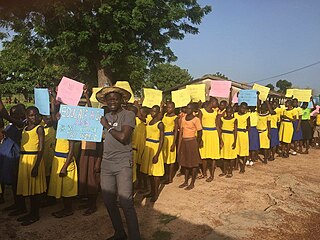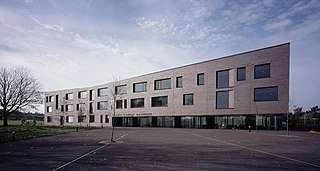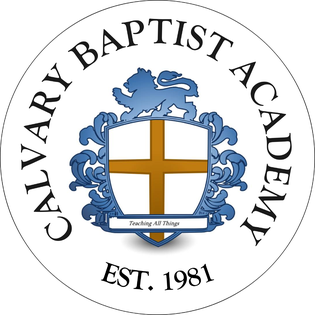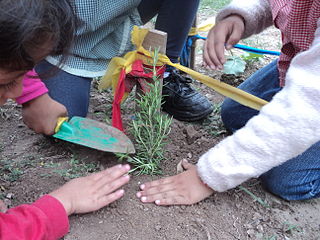
Physical education, often abbreviated to Phys. Ed. or PE, and sometimes informally referred to as gym class or simply just gym, is a subject taught in schools around the world. PE is taught during primary and secondary education and encourages psychomotor, cognitive, and effective learning through physical activity and movement exploration to promote health and physical fitness. When taught correctly and in a positive manner, children and teens can receive a storm of health benefits. These include reduced metabolic disease risk, improved cardiorespiratory fitness, and better mental health. In addition, PE classes can produce positive effects on students' behavior and academic performance. Research has shown that there is a positive correlation between brain development and exercising. Researchers in 2007 found a profound gain in English Arts standardized test scores among students who had 56 hours of physical education in a year, compared to those who had 28 hours of physical education a year.

The University of Asia and the Pacific is a private university in the Philippines. It traces its beginnings to the Center for Research and Communication (CRC), which was established on August 15, 1967, as a private think-tank that conducted economic and social research and offered graduate courses in economics.

Baptist Lui Ming Choi Secondary School (BLMCSS) is a Baptist secondary school in Sha Tin, Hong Kong, near Lek Yuen Estate. It was established in 1978 by the Baptist Convention of Hong Kong. Situated in the new town of Sha Tin, the school is a co-educational grammar school offering education at the first to sixth form levels education in Hong Kong. English is the major medium of instruction whereas Cantonese are used for subjects like Chinese Language, Chinese History, Chinese Literature, Liberal Studies, Visual Arts, Physical Education. In junior forms, Mandarin Chinese is also taught. The school has mission in providing an all-round education based on Christian values by nurturing their moral, intellectual, physical, social, aesthetic and spiritual skills, knowledge and attitude. It is a band 1 school.
The International School of Curitiba (ISC), founded in 1959, is located in Curitiba, Paraná, Brazil.
Trinity Valley School ("TVS") is a PK-12, co-ed, independent school in Fort Worth, Texas. Trinity Valley School has four main objectives for its students: fine scholarship with its fulfillment at college; the development of wide constructive interests; intelligent citizenship; and spiritual and moral development which promotes lasting values. Trinity Valley School is a member of the Southwest Preparatory Conference and is accredited by the Independent Schools Association of the Southwest (ISAS).
Danube International School Vienna

Inclusion in education refers to including all students to equal access to equal opportunities of education and learning, and is distinct from educational equality or educational equity. It arose in the context of special education with an individualized education program or 504 plan, and is built on the notion that it is more effective for students with special needs to have the said mixed experience for them to be more successful in social interactions leading to further success in life. The philosophy behind the implementation of the inclusion model does not prioritize, but still provides for the utilization of special classrooms and special schools for the education of students with disabilities. Inclusive education models are brought into force by educational administrators with the intention of moving away from seclusion models of special education to the fullest extent practical, the idea being that it is to the social benefit of general education students and special education students alike, with the more able students serving as peer models and those less able serving as motivation for general education students to learn empathy.

Christ's College is a grade 11 to 16 secondary school administered by the Church of England that serves the Bellfields neighborhood of Guildford, Surrey, and England.

Don Bosco School Manila (full school name: Don Bosco School (Salesian Sisters), Inc. - Manila, also known as DBS), is an educational institution owned and operated by the Daughters of Mary Help of Christians (FMA) in the National Capital Region of the Philippines. Established in 1989, Don Bosco School Manila offers co-educational education for primary (elementary) and secondary education (high-school and senior high school). Don Bosco School also offers night school (Alternative Learning System).

St Paul's Grammar School is an independent, non-denominational Christian, co-educational early learning, primary, and secondary day school. It is located in Cranebrook, an outer western suburb of Sydney, New South Wales, Australia. The school was established in 1983 and currently enrolls approximately 860 students, from early learning through kindergarten to year 12.
The Atonement Academy is a parochial, Catholic school in the Personal Ordinariate of the Chair of Saint Peter in San Antonio, Texas. It is a part of Our Lady of the Atonement Catholic parish, the first parish for the Anglican Use liturgy with the Catholic Church, and was opened on August 15, 1994. The college preparatory school curriculum was inaugurated in 2004, the first seniors graduating in 2008. The K-8 section of The Atonement Academy is designated as a "Blue Ribbon School of Excellence" by the Department of Education. The high school has neither applied for nor has it qualified for that designation. The school seal is the pelican. The student population for the 2011–2012 school year totaled approximately 550 students. The academy is accredited by the Texas Catholic Conference Accreditation Commission (TCCAC), the accrediting authority for all Catholic schools in the State of Texas, and has been awarded the Catholic High School National Honor Roll Award.
The National Curriculum Framework 2005 is the fourth National Curriculum Framework published in 2005 by the National Council of Educational Research and Training (NCERT) in India. Its predecessors were published in 1975, 1988, 2000.
Values education is the process by which people give moral values to each other. According to Powney et al. It can be an activity that can take place in any human organisation. During which people are assisted by others, who may be older, in a condition experienced to make explicit our ethics in order to assess the effectiveness of these values and associated behaviour for their own and others' long term well-being, and to reflect on and acquire other values and behaviour which they recognise as being more effective for long term well-being of self and others. There is a difference between literacy and education.

Introduction

Garden-based learning (GBL) encompasses programs, activities and projects in which the garden is the foundation for integrated learning, in and across disciplines, through active, engaging, real-world experiences that have personal meaning for children, youth, adults and communities in an informal outside learning setting. Garden-based learning is an instructional strategy that utilizes the garden as a teaching tool.

Uruguayan American School (UAS) is an American private international school in Carrasco, Montevideo. It serves nursery through grade 12. As of 2024 it has approximately 350 students, including students from Uruguay and 32 other nationalities. Students at the Uruguayan American School have the opportunity to earn the US high school diploma, the IB Diploma, and, in many cases, the Uruguayan Diploma. The school's educational program is designed to prepare students for academic and professional pursuits in various global contexts.
Academic achievement or academic performance is the extent to which a student, teacher or institution has attained their short or long-term educational goals. Completion of educational benchmarks such as secondary school diplomas and bachelor's degrees represent academic achievement.
Liberty Baptist School, formerly United Baptist, was established in September 1968, in San Jose, California, consisting of ten pupils with Mrs. Cherie Noel as principal and teacher. Liberty Baptist School is accredited by the Western Association of Schools and Colleges and the American Association of Christian Schools.
Global citizenship education (GCED) is a form of civic learning that involves students' active participation in projects that address global issues of a social, political, economic, or environmental nature. The two main elements of GCE are 'global consciousness'; the moral or ethical aspect of global issues, and 'global competencies', or skills meant to enable learners to participate in changing and developing the world. The promotion of GCE was a response by governments and NGOs to the emergence of supranational institution, regional economic blocs, and the development of information and communications technologies. These have all resulted in the emergence of a more globally oriented and collaborative approach to education. GCE addresses themes such as peace and human rights, intercultural understanding, citizenship education, respect for diversity and tolerance, and inclusiveness.
Inclusive Classroom is a term used within American pedagogy to describe a classroom in which all students, irrespective of their abilities or skills, are welcomed holistically. It is built on the notion that being in a non-segregated classroom will better prepare special-needs students for later life. In the United States, the Rehabilitation Act of 1973 guaranteed civil rights to disabled people, though inclusion of disabled students progressed slowly until the No Child Left Behind Act of 2001, after which almost half of US students with disabilities were soon in general classrooms.











